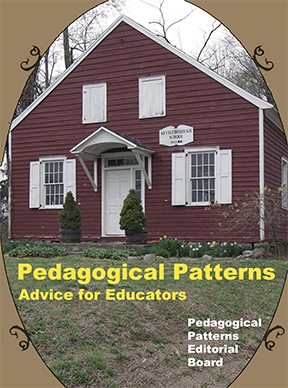Finally we've published our collection of Pedagogical
Patterns - our advice for educators!
 Pedagogical
Patterns: Advice for Educators
Pedagogical
Patterns: Advice for Educators
Pedagogical Pattern Editorial Board: Joseph Bergin, Jutta Eckstein, Markus Völter,
Marianna Sipos, Eugene Wallingford, Klaus Marquardt, Jane Chandler, Helen Sharp,
Mary Lynn Manns (Eds.)
Published by Joseph Bergin Software Tools, 2012
epub for Kindle,
IPad
and now as well in print!
What are Pedagogical Patterns
Patterns are designed to capture best practice in a specific domain.
Pedagogical patterns try to capture expert knowledge of the practice of
teaching and learning. The intent is to capture the essence of the
practice in a compact form that can be easily communicated to those who
need the knowledge. Presenting this information in a coherent and
accessible form can mean the difference between every new instructor
needing to relearn what is known by senior faculty and easy transference
of knowledge of teaching within the community.
In essence a pattern solves a problem. This problem should be one that
recurs in different contexts. In teaching we have many problems such as
motivating students, choosing and sequencing materials, evaluating
students, and the like.
These problems do recur and in slightly different form each time. Each
time a problem pops up there are considerations that must be taken into
account that influence our choice of solution. These forces push us
toward or away from any given solution to a problem. A pattern is
supposed to present a problem and a solution. The problem together with
the forces must apply to make that solution beneficial to the problem.
Pattern Languages
A pattern language is a set of patterns that work together to generate
complex behavior and complex artifacts, while each pattern within the
language is itself simple. The patterns community has begun to realize
that patterns in isolation provide only incremental improvements to
software systems, organizations and processes. Pattern languages, on the
other hand, promise to drive fundamental and lasting improvements. One
very successful pedagogical pattern language is Seminars by Astrid Fricke
and Markus Voelter (see Example Patterns). It describes how to
design and deliver a short course. Little in this language (or any
pattern language) is novel, but it brings together in one place expert
knowledge that is often forgotten and sometimes overlooked.
Who is part of this project
A number of educators have been involved in
the pedagogical patterns project for several years. There is this international
web site with contributions, including some of these. Contributions are eagerly
sought and members of the community are happy to work with new pattern authors
to develop their work.
 Pedagogical
Patterns: Advice for Educators
Pedagogical
Patterns: Advice for Educators